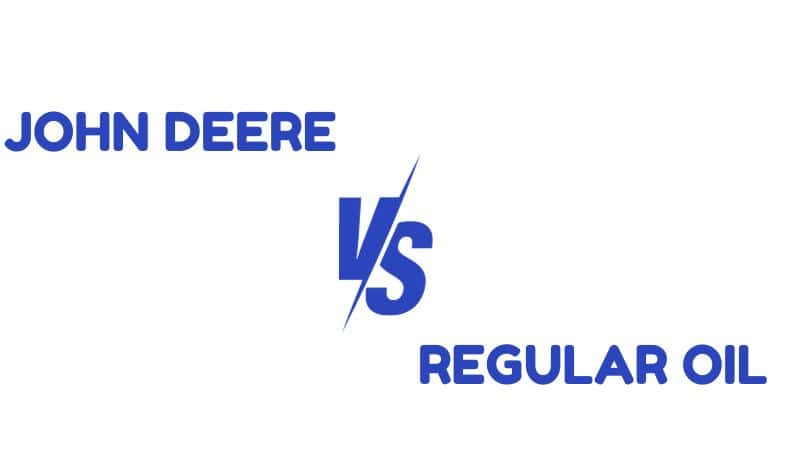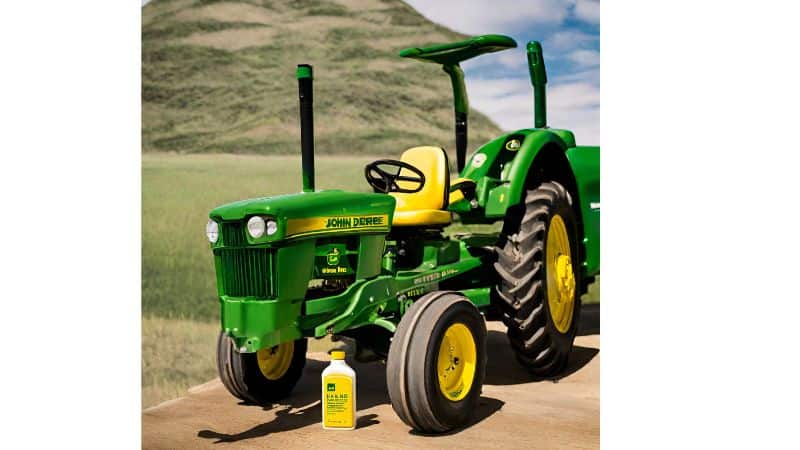You should use the right engine or transmission system oil to get the best performance from your equipment. Is it time to change your oil in John Deere vehicles? Do you always use John Deere oil for it and want to know alternatives to this oil?
Actually, there are many debates about John Deere oil and regular oil. John Deere vs regular oil: which oil can I use, and is there a difference? You may wonder. Please keep reading to know the difference between them and more information.
Who Makes John Deere?
John Deere manufactures diesel engines, heavy equipment drivetrains, agricultural, lawn, and garden components, and heavy and forestry machinery. In the 2019 rankings in the Fortune Americas, this company was ranked 329th and 87th overall.
This company also offers financial services. Deere Company doesn’t have a specific manufacturer, unlike other manufactured industrial and agricultural product lines, so assigning a name is challenging. The reason is that it changes yearly and sometimes from month to month.
John Deere gives a contract to the lowest bidder who could fulfill all requirements. Northland Oil produces John Deere’s regular tractor engine oil. And the John Deere Plus-50 engine oil’s primary blender is Chevron. Furthermore, John Deere’s owner’s manual states that you should use John Deere oil for John Deere engines. The John Deere oil capacity is 16 quarts of oil.
John Deere Oil Vs. Regular Oil: Differences?
John Deere oil has unique properties that make it different from other oils. And, of course, they need more time to reveal their secret formula to stay ahead of the competition. John Deere employees differ from other oils from their experience. Let’s see the differences between John Deere oil and regular oil.

- John Deere Oil Vs Regular Oil Less Wear And Oxidation:
John Deere manufactures a variety of engine oils with different grade levels. For example, Plus 50 II, Torq-Gard, and Turf Guard exist. For 500 hours, these types and regular oils were tested under high temperatures. It aims to compare the tested machine parts’ oxidation levels and wear rates.
After testing them, it’s proven that John Deere oil is cleaner with low discoloration. If you compare it with regular oil, the results show that John Deere oil provides less oxidation and wear.
- John Deere Oil Vs. Regular Oil Specifications:
John Deere has a specification, and it comes for the oils that they market. This specification is like a “recipe”. It indicates their oil comes with ingredients of anti-foam and anti-wear additives. John Deere owns it, no matter which company they hire to blend or package the oil. Also, John Deere Oil meets the SAE J300 specification for the SAE viscosity grade. This oil is also compatible with the API service category listed. The API service categories are CJ-4, CI-4, CH-4, SM, SL, and SJ.
In principle, all engine oil’s purpose is the same. That means all engine oils work to lubricate the engine’s moving parts, prevent corrosion and wear, and ensure heat dissipation. So, all regular engine oil meets the specifications of ACEA, JASO, and API. Mainly, API classes describe American requirements and quality standards for engine oils. Engine oil specifications are divided into API S, API C, and API F.
- John Deere Oil Vs. Regular Oil Viscosity:
Viscosity is one of the most essential oil properties, which is the measure of the internal fluid. Besides, thickness indicates how thin or viscous an oil is and how it behaves depending on the various temperatures. Hence, SAE has published a system that defines temperatures, viscosity limits, and class for engine oils.
Some regular monograde oils are compatible with specific kinematic viscosity at 100°C, SAE 30. So, when changing regular oil in automobiles in winter and summer, you can use this viscosity-grade oil. In contrast, Jhon Deere viscosity grade 10w40, 5w30, and 10w30 is available.
- John Deere Oil Vs. Regular Oil Additives:
Due to additive packages, John Deere oil is different from regular oil. And it’s the main difference between John Deere and other types of oil. Nevertheless, there needs to be more information about John Deere’s additives.
Previous workers of John Deere have mentioned these additives. However, John Deere’s additives indicate that the oil has anti-foam anti-wear properties. These additives make the John Deere oil more strong than Regular oil. Moreover, workers also found that many Regular oils don’t perform best in heavy-duty off-road applications.
They only are marketed for on-road applications. Yet, many regular oils meet only API specifications but don’t exceed them. That means only some Regular oils are good in the market. It would help if you only looked at the additives you can use for your off-road applications.
- John Deere Oil Vs Regular Oil Price:
What’s the difference between John Deere oil vs. regular oil cost? You may surprised. Well, if you want to compare John Deere with other oils, it’s more expensive. You can find multiple options for diesel tractors, for example, Shell Rotella, famous for tractors on tractor forums. You need to spend about $15 for a whole gallon.
Nowadays, you must pay $25 to $40 for John Deere oil anywhere. But for Regular oil, you may need to spend half of this cost. Actually, it’s no wonder most people see John Deere oil as an expensive substitute. Remember that prices can vary based on your oil for your equipment.
John Deere Engine Oil Recommendation

John Deere Manufacturers recommended using John Deere oil for John Deere tractors, mowers, and other engines. Notably, you can use this oil in different brands of machines with the same viscosity to the manufacturer’s specifications. From multiple options, which oil is best, understanding is very tough. Before using any oil, it is best to ask your manufacturer or dealer. It’s because they are always trying to improve the quality of their products.
John Deere Plus 50 II Engine Oil Equivalent
John Deere Plus 50 II Engine oil offers complete protection in low-emission (IT4) and older engines. In addition, it is ideal for off-road applications at extreme temperatures. But what is the equivalent of this oil? It’s best to know the equivalent of any product. It can save money or life when driving on the highway. So, you can use the equivalent if you suddenly need to change the oil. Likewise, you can use alternatives if you have no oil in your stock and place. Ergo, as an equivalent of John Deere plus 50 oil, you can use Shell Rotella 15w40. Mainly, it will provide the same performance when you use this oil on your John Deere.
John Deere Hydraulic Oil
John Deere engineers manufactured this hydraulic oil uniquely to meet the requirements of John Deere engines. Therefore, this hydraulic oil is a multi-viscosity oil with a high-viscosity index—the ISO 46 and 68 grades of its viscosity. Indeed, by specifying any of these grades, you can use them in many applications.
Applications:
Though this hydraulic oil is only designed for John Deere engines, you can use it in many non-John Deere hydraulic systems.
Final Word
On the other hand, multiple options are available on the market, and you may be confused which is better. Nonetheless, in this blog post, we have discussed John Deere oil vs. regular oil. Furthermore, many people also want to know which is better for engines from them. So, we are trying to discuss them in depth. Finally, after reading this post, we hope you can ideally choose a better one for your engine.
